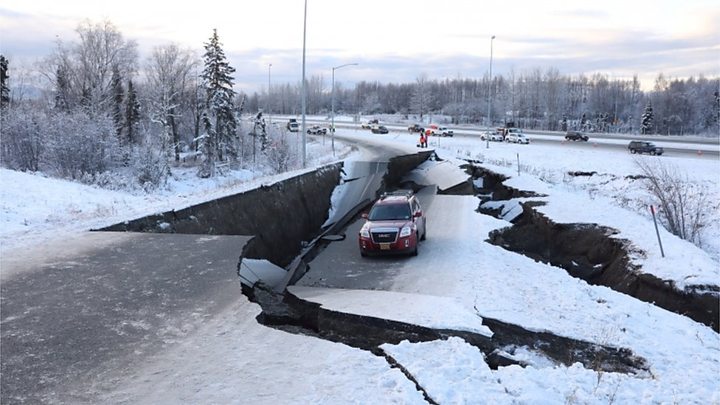Back-to-back earthquakes measuring 7.0 and 5.7 shattered highways and rocked buildings Friday in Anchorage and the surrounding area, sending people running into the streets and briefly triggering a tsunami warning for islands and coastal areas south of the city.
A large section of an off-ramp near the Anchorage airport collapsed, marooning a car on a narrow island of pavement surrounded by deep chasms in the concrete. Several cars crashed at a major intersection in Wasilla, north of Anchorage, during the shaking.
The quake broke store windows, knocked items off shelves, opened cracks in a two-story, downtown building, disrupted electrical service and disabled traffic lights, snarling traffic. It also threw a full-grown man out of his bathtub.
Flights at the airport were suspended for hours after the quake knocked out telephones and forced the evacuation of the control tower. And the 800-mile Alaska oil pipeline was shut down while crews were sent to inspect it for damage.
“It’s one of those things where in your head, you think, ‘OK, it’s going to stop,’ and you say that to yourself so many times in your head that finally you think, ‘OK, maybe this isn’t going to stop,'” he said.
Soon after the shaking ended, the school bus pulled up and the children boarded, but the driver stopped at a bridge and refused to go across because of deep cracks in the road, Lettow said.
Walker says it will take more than a week or two to repair roads damaged by the earthquake.
“This is much more significant than that,” he told reporters at a news conference.
Walker leaves office on Monday, and he said members of Gov.-elect Mike Dunleavy’s staff had been involved with the earthquake response to ensure a smooth transition.
“This isn’t a time to do anything other than take care of Alaskans, and that’s what we’re doing,” he said.
The state averages 40,000 earthquakes a year, with more large quakes than the 49 other states combined. Southern Alaska has a high risk of earthquakes because the Earth’s plates slide past each other under the region.
David Harper was getting coffee at a store when the low rumble began and intensified into something that sounded “like the building was just going to fall apart.” He ran for the exit with other patrons.
“People who were outside were actively hugging each other,” he said. “You could tell that it was a bad one.”
